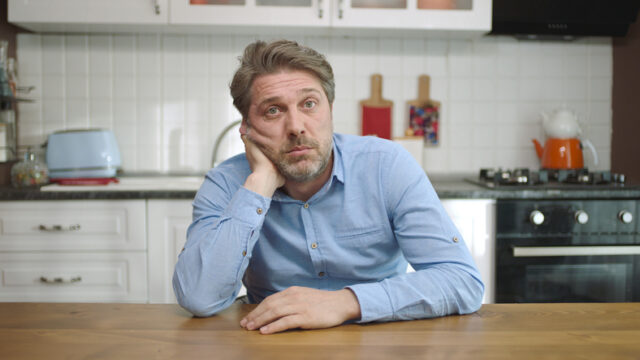It’s normal to feel sad, anxious, or lonely sometimes — that’s just part of life.

However, it can be hard to tell the difference sometimes between a temporary funk and a serious decline in mental health. You might not want to admit to yourself (or anyone else) that you’re not in a good place, and while that’s a common experience, it can ultimately be a destructive one. If you can’t admit you’re struggling, you’ll never get the help you need to feel better. Here are some excuses you might be making to mask the reality that your mental health is not in a good place.
1. You’re “just tired” all the time.

Sure, everyone has long days, but if you’re constantly saying, “I’m just tired,” it might be a sign that there’s more going on. Chronic exhaustion can be a sign of burnout or stress, especially if rest doesn’t seem to help. It’s okay to admit that your “tired” might actually be something deeper.
2. You brush off stress as “normal.”

If you catch yourself thinking, “Everyone’s stressed these days,” that’s true, but it doesn’t mean it’s healthy. Chronic stress can sneak up on you, especially if you’ve normalised it. Remind yourself that while stress happens, constant stress isn’t meant to be your baseline.
3. Your self-care routine has become non-existent.

When was the last time you did something just for yourself? If self-care has fallen to the bottom of your list, it’s a sign you might be neglecting your mental well-being. Taking even a few minutes for yourself isn’t selfish; it’s necessary to recharge and feel balanced.
4. You keep telling everyone you’re “fine.”

“I’m fine” is a classic line, but if you’re saying it a little too often, it might be worth examining. Sometimes, “fine” is just a cover for feeling overwhelmed, anxious, or down. Being open about your feelings with people you trust can make a world of difference.
5. Your hobbies feel like chores.

When activities that used to make you happy start feeling like obligations, it’s a sign something might be off. Hobbies are meant to relax you, so if they’re starting to feel like extra work, it might be time to take a step back and check in with yourself.
6. You’re ignoring small health issues.

Physical health and mental health are closely linked. If you’re ignoring headaches, tension, or even frequent colds, it could be a sign of stress or mental strain. Don’t brush off these physical signs; they’re your body’s way of telling you to slow down.
7. You’re constantly distracted or forgetful.

Everyone forgets things sometimes, but if you’re constantly zoning out or can’t remember simple tasks, it could be a sign of mental overload. When your brain’s on overdrive, it can struggle to keep up, so don’t ignore the little lapses in focus.
8. You’re snapping at people more than usual.

We all have bad days, but if you find yourself being snappy or irritable with people who don’t deserve it, it might be a sign you’re stressed. A short temper can be a warning sign that you’re stretched too thin and need to give yourself some grace.
9. Your sleep schedule is all over the place.

Late nights, early mornings, and irregular sleep can be a huge sign that your mental health is struggling. Good rest is crucial for mental clarity, so if your sleep is out of whack, it’s worth considering what’s keeping you up—or what’s making you avoid bedtime.
10. You’re over-relying on “comforts” like junk food or screen time.
 Source: Unsplash
Source: Unsplash Comfort foods and a little binge-watching can be great now and then, but if you’re leaning on them too much, it might be a sign you’re trying to escape from stress. Finding healthier ways to relax can help break the cycle and boost your mood naturally.
11. You’re avoiding your friends or family.

If you’re dodging texts, cancelling plans, or just feeling like you don’t want to see people, it’s a sign something’s up. While alone time is healthy, isolating yourself can be a sign of declining mental health, and reconnecting with people who care about you might help.
12. You’re feeling “blah” about everything.
 Source: Unsplash
Source: Unsplash If everything feels flat or uninteresting, it might mean your mental health needs a boost. Apathy can be a sign of emotional fatigue, especially if it’s creeping into areas of your life that you used to care about. Recognising that feeling “blah” is a call to start looking after yourself a bit better.
13. You’re constantly multitasking but getting nothing done.

If you’re bouncing between tasks without finishing anything, it could be a sign your mind is struggling to focus. Constant multitasking can add to stress and make you feel overwhelmed, so take it as a sign to slow down and focus on one thing at a time.
14. You’re neglecting basic tasks.

If chores, errands, or even showering feel overwhelming, it’s a sign your mental health might need attention. When simple tasks start to feel like mountains, it’s usually a sign you’re running on empty. Taking small steps to care for yourself can help bring back a sense of control.
15. You’re downplaying your feelings.

If you’re quick to say, “It’s not a big deal,” you might be minimising your own struggles. Acknowledging your emotions is an important part of mental health. Instead of brushing off your feelings, try allowing yourself to feel them and process what they’re telling you.
16. You’re constantly busy, but not really productive.

When you’re always “busy” but don’t feel like you’re getting much done, it could be a sign you’re avoiding bigger feelings or issues. Being busy can feel like an escape, but it’s important to slow down and ask yourself why you’re keeping yourself so occupied.




